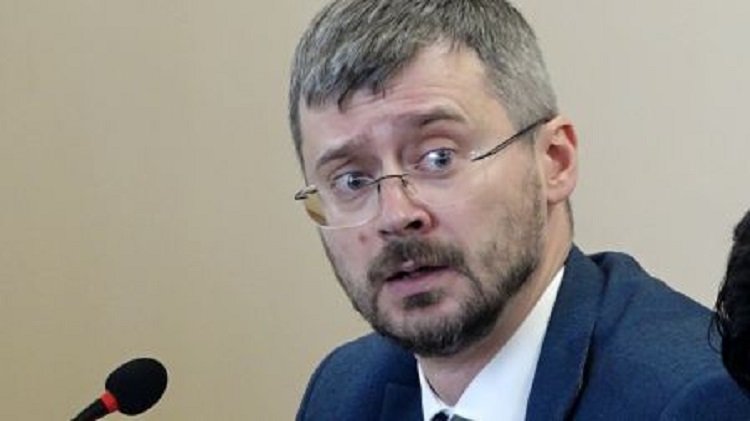Islamabad, (TDI): Russian Ambassador to Pakistan, Albert P. Khorev, on Monday addressed the media on the ongoing conflict in Ukraine, highlighting Russia’s perspective on the situation.
In the briefing, Ambassador Khorev criticized Western countries for their continued military support to Ukraine and alleged direct involvement of the U.S. and Europe in planning recent operations by the Ukrainian armed forces.
Opening his remarks, Ambassador Khorev underscored the significance of the date, September 30, noting that one year ago, President Vladimir Putin signed treaties incorporating the Donetsk People’s Republic, Lugansk People’s Republic, Zaporozhye, and Kherson regions into the Russian Federation.
He asserted that these regions had exercised their right to self-determination through referendums and are now legally part of Russia.
He then focused on recent incidents in the border regions, accusing Ukrainian forces of launching large-scale attacks against Russian civilian areas, specifically the Kursk region, on August 6.
According to the ambassador, these actions were “brutal and terroristic,” involving the shooting of civilians, looting, and the targeting of journalists and residential buildings.
“The attacks on our regions have not only targeted civilians but also medical facilities and schools, with perpetrators openly using Nazi symbols and emblems,” Khorev stated.
Khorev claimed that the attacks were carried out with direct support from the United States and European countries, who are supplying weapons and tactical guidance to the Ukrainian armed forces.
He cited statements from Ukrainian officials and Western leaders as evidence that NATO countries are actively encouraging the use of long-range missiles against Russian territory.
“These reckless actions are pushing the world to the brink of a direct military confrontation between Russia and NATO,” Khorev warned, adding that the West’s involvement is aimed at prolonging the conflict rather than achieving a peaceful settlement.
Impact of Ukrainian Actions
Khorev described the Ukrainian military’s recent advances in the Kursk region as a “gesture of desperation” in response to their alleged losses on the battlefield.
He argued that the incursion was intended to improve Ukraine’s negotiating position in case of future talks, disrupt the stable political situation in Russia, and extract more aid from Western backers.
However, Khorev claimed that these objectives had failed, noting that Russia’s resolve had only strengthened as a result.
“In fact, the invasion has led to greater consolidation within Russian civil society, with the number of volunteers signing up to join the Special Military Operation increasing significantly,” he added.
Also Read: Global economic effect of Russia Ukraine Crisis
Ambassador Khorev provided a detailed account of ongoing military operations in the Donbass region, stating that Russian forces are continuing their offensive and have approached the strategic logistics hub of Pokrovsk.
He highlighted the humanitarian toll of the conflict, citing over 39,000 instances of shelling by Ukrainian forces since the start of Russia’s Special Military Operation, with more than 5,000 civilian deaths recorded in Donbass alone.
Turning to nuclear concerns, Khorev accused Ukraine of regularly shelling the Zaporozhye nuclear power plant, which he described as the largest civilian nuclear facility in Europe.
He warned that continued attacks could endanger the entire continent and noted that similar attacks have been launched against the Kursk nuclear power plant using drones.
The Ambassador cited International Atomic Energy Agency (IAEA) Director General Rafael Grossi’s visit on August 11 and August 27, where the risk of disaster was allegedly observed firsthand.
Ambassador Khorev’s briefing also delved into the broader geopolitical context, arguing that the conflict is part of the West’s attempt to maintain global dominance.
Also Read: Arab countries face pressure amidst Russia Ukraine Crisis
He accused the U.S. and its allies of using the crisis to impose sanctions and exert economic pressure on Russia, while simultaneously increasing their control over developing nations.
“Against the backdrop of changing economic patterns and the emergence of new centers of power, the West is rapidly losing its monopoly in a number of areas,” he said.
Khorev pointed to the disproportionate levels of Western aid to Ukraine compared to support for the Global South.
According to his figures, the U.S. has allocated $175.5 billion in support of the Kiev regime since February 2022, while the EU has provided 81.4 billion euros, far outstripping aid to developing countries.
Khorev noted that Pakistan, for instance, has had to undergo protracted negotiations with the IMF for a few billion dollars, whereas Ukraine received a $15.6 billion package last year—577% of its country quota.
“This clearly illustrates the West’s priorities and its manipulation of international financial institutions,” he commented.
Addressing the prospects for peace, Khorev reiterated Russia’s willingness to engage in a political and diplomatic settlement of the conflict but dismissed Ukraine’s “Zelensky formula” as unrealistic and biased.
He argued that the Ukrainian proposal fails to address what Russia considers the root causes of the conflict, including the rights of Russian-speaking populations in Ukraine and Ukraine’s alignment with NATO.
Also Read: Ukraine Claims to Have Captured 1,000 sq km of Russian Territory
“Agreeing to the Zelensky formula would mean de facto supporting the extermination of Russians,” Khorev stated.
Instead, he outlined President Putin’s own conditions for peace, which include:
The withdrawal of Ukrainian armed forces from the territories of Donetsk, Lugansk, Kherson, and Zaporozhye.
Ukraine’s formal abandonment of its NATO membership ambitions.
The lifting of all “illegal” Western sanctions against Russia, and respect for the rights of the Russian-speaking population in Ukraine.
Khorev concluded by emphasizing the benefits of an early negotiated end to the conflict, not only for Russia and Ukraine but also for countries in the Global South, including Pakistan.
He stated that the lifting of sanctions would open new opportunities for trade and cooperation, particularly in the areas of energy and food security.
He highlighted Russia’s role as a leading exporter of fertilizers and its vast oil and gas reserves, which he said could help address Pakistan’s energy and agricultural needs.
Farkhund Yousafzai is an Associate Editor at The Diplomatic Insight.



